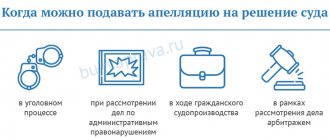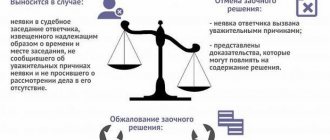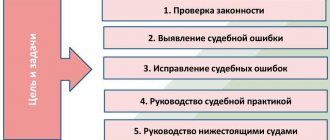Many citizens are faced with the fact that they are subject to court sanctions based on a decision made in absentia. This comes as a surprise to a person, because he has not been to court and often does not even know why he was awarded this or that penalty. This procedure is often resorted to by credit and microfinance organizations, which are comfortable with the absence of the other party in the process. Therefore, the question of canceling a decision made without the applicant is relevant in such cases. For this purpose, the Code of Civil Procedure of the Russian Federation provides for a certain algorithm of actions. It is important to take into account all the procedural nuances for the appeal to be successful.
Features of absentee proceedings
This type of legal proceedings follows the general rules of civil litigation. Its features are provided for in Chapter 22 of the Code of Civil Procedure of the Russian Federation. A trial in absentia is such a case when the second party to the case - the defendant or defendants - did not appear at the court hearing. The difference between the verdict and the simplified procedure for its cancellation and the appointment of further trial.
This method of legal proceedings is provided in order to protect the plaintiff when the responding party evades participation in the process. Therefore, when the defendant ignores the hearing, the court has the opportunity to decide the case in his absence. But since in civil proceedings the positions of all participants must be considered for maximum objectivity, basically only simple cases where the circumstances are clear and consistent are considered in this way. In other cases, consideration is postponed. There are also a number of restrictions in the legislation when absentee proceedings are impossible - when the amount of the claim exceeds a certain limit, cases considered in special proceedings, as well as some other categories.
Conditions for absentee consideration
The court can make a decision without a second participant if several conditions are met (Article 233 of the Code of Civil Procedure):
- The responding party has been duly notified. At the same time, the file must contain documents confirming this fact - for example, a postal notification with a receipt stamp.
- The defendant did not submit a motion to the court to postpone the case due to the inability to appear at the trial. Moreover, such a petition can be either motivated (with a good reason and evidence of its existence), or brief, without explaining the circumstances. In any case, the judicial authority heeds the application and postpones the meeting.
- The responding party did not submit a request to consider the case without its presence (in this case, the court is authorized to issue an opinion in the usual, in-person manner, if the circumstances of the case allow it).
- All persons named in the case as defendants did not appear. If one of them is present and the other is not, the meeting is adjourned.
Important.
The plaintiff must be warned that the conclusion will be issued in absentia (his consent is asked for this at the beginning of the process). However, Art. 233 allows such a review to be carried out without the plaintiff, if he has sent written consent in advance. Then the meeting is held without both parties.
Often the plaintiff is not warned that such a review mechanism has its disadvantages for him. In addition to the simplified appeal procedure, as a result of which the case will be reopened, in such a process the plaintiff cannot change the subject of the claim, its amount and grounds. The verdict is rendered only in the part with which the other party was familiarized.
How does an absentee meeting take place?
Only cases of first instance can be considered in this way. In general, the judicial process is regulated by the general rules of claims hearings in civil cases (Article 234 of the Code of Civil Procedure of the Russian Federation). The adopted ruling on the order in absentia is recorded in the record of the case; there is no separate procedural document for it.
The judge reviews the case materials, evaluates the available evidence, and also listens to the position of the plaintiff. Since the defendant is not present at the trial, he will not be able to present his objections. It follows from this that this procedure is more in line with the interests of the prosecutor and is most often used in those cases where the plaintiff’s arguments are obvious: collection of alimony, divorce, non-payment of a loan, violation of debt or contractual obligations.
The result is a decision in absentia , which states during what time and in what instance this act can be challenged in a special (simplified) procedure.
The court's decision
A verdict in absentia is drawn up on the same principle as an ordinary decision. First, a thesis conclusion is issued on the merits, which is announced immediately after adoption by the judge. This is the operative part, but the full text, the so-called reasoned decision, can be drawn up within 5 days.
An important difference is that this document contains references to norms of procedural legislation that allow a meeting to be held unilaterally.
After a decision is made (not to be confused with drawing up a reasoned document), it must be sent to the defendant within three days. The letter is sent by mail with acknowledgment of delivery. If the plaintiff was also not present, the document is sent to him within three days in a similar manner.
How to cancel a court decision in absentia that has entered into legal force
In the provided sample petition from the defendant, the judge is required to find the grounds for canceling the court's default judgment. More precisely, this is a valid reason for which he did not come to the meeting; moreover, it is necessary to see the circumstances that are important for the case. Perhaps presenting them at the hearing could change the outcome of the case.
The main thing is that issuing a ruling on cancellation is not enough; this does not mean that everything decided by this authority is canceled. In his ruling, the judge also schedules the case for hearing again and will consider it, notifying all parties again, allowing the defendant to state his position. Accordingly, the plaintiff does not need to file a civil claim again.
Cancellation of a court decision in absentia - judicial practice
If all the conditions for filing a request to cancel a decision that has entered into legal force are met, the courts in the Russian Federation in most cases cancel them and set a new date for the hearing. A court decision in absentia cannot be canceled if a valid reason for failure to appear is not evident in the attached documents. For example, if a person knew about the appointment of a hearing and was absent from it, being sent to another city. In such a situation, the judge will not accept such a reason as valid, since the defendant had the opportunity to file a motion to postpone the hearing.
How to cancel a default judgment on a loan
A fairly common event is the adoption of a judicial act to collect debt on a loan without the presence of the debtor. Then banks try to obtain the act that has entered into legal force as quickly as possible in order to transfer it for execution.
Having canceled the original act by its ruling, the court must send a letter to the bailiffs about reversing the execution or about suspending it. The banking agreement will not be terminated, but collection will be suspended.
Appeal procedure
A court decision in absentia provides for a special, simplified procedure for its cancellation, regulated by Art. 237 of the Code of Civil Procedure of the Russian Federation - this mechanism is designed to protect the rights of the defendant. Within 7 days, which begin to flow from the moment the judicial act is served, he has the right to file an application to cancel the issued conclusion.
Such an application can only be filed by the responding party; the plaintiff does not have such a right, even if the case was considered in his absence (with written consent).
In addition, the defendant retains the right to review the case in the second instance - appeal, within a month after the expiration of the period allotted for filing the application. This mechanism is no different from a regular appeal and is carried out in the manner prescribed by Chapter. 39 Code of Civil Procedure of the Russian Federation. An appeal can be filed by both parties to the process.
Deadlines for appeal
The mechanism for reversing a verdict in absentia has some peculiarities in calculating time limits, which should be kept in mind in order not to miss procedural periods.
Please note: the 7-day period during which you can file an application for cancellation begins to run from the day the defendant received a copy of the judicial act, which, we remind you, must be sent within 3 days after the hearing.
According to the Review of Judicial Practice of the Supreme Court of the Russian Federation No. 2 dated June 26, 2015, the following algorithms for calculating time limits in controversial situations are provided:
- There are cases when the sent copy of the document never reaches the addressee, the responding party, who either changed his place of residence or deliberately ignores postal notifications. When there is no information about a person receiving a copy of a court document, the following approach is practiced: the deadlines are summed up. Thus, after the expiration of three days allotted for sending the document, then seven days for filing an application for cancellation, and 30 days provided for an appeal, the act comes into force.
- The review also provides for a mechanism for restoring deadlines. If a copy of the verdict was delivered to the defendant after the 7 days allotted for filing the application, but before the end of the 30 days during which there is a right to review the case, the time limit for filing a summary application can be restored. If the month has already expired and the act has entered into force, you can restore the period for appeal in the general manner.
- In all cases, the day on which the person received the document is not counted; the period begins to be calculated from the next day.
The entry into force of the decision also differs from the standard period. The verdict in absentia will come into force not in a month, but in 5 weeks - when both deadlines for reversal and appeal have passed.
How to make an application
Art. is devoted to drawing up an application to cancel a default judgment. 238 Code of Civil Procedure of the Russian Federation. In accordance with its provisions, the document must have the following structure:
- in the header - details of the judicial authority that examined the case in the first instance, as well as the number of the case, the conclusion of which is being disputed;
- The applicant’s full name or the name of the organization, if it is a legal entity, place of residence (location), often the court office also asks for a contact telephone number;
- evidence of the reasons that served as the basis for the defendant’s failure to appear, as well as evidence that he did not have the opportunity to warn the court about this (for example: he was traveling abroad, did not receive a court notice, was in a hospital in serious condition, etc. .);
- a resolution indicating the essence of the appeal: “I ask the court to cancel the decision made in connection with...”;
- list of attachments: files and documents that are evidence and related to the case materials (previously attached ones do not need to be sent again);
- signature of the applicant and date of drawing up the application.
Important. In this appeal, it is necessary to indicate not only the reasons for failure to appear, but also the circumstances that may influence the change in the opinion of justice. The judge will not cancel a decision in absentia that is correct on its merits in order to make the same decision at the next hearing. These facts must also be supported by evidence.
A sample application to cancel a court decision in absentia can be downloaded here.
Grounds for cancellation
The factors that are the reason for the cancellation of the issued act are listed in Art. 242 of the Code of Civil Procedure of the Russian Federation (all three points must be confirmed):
- evidence of the defendant’s failure to appear for good reasons beyond his will;
- the impossibility of timely reporting of these reasons to the court;
- facts relevant for reviewing the case on the merits.
How to submit an application
The document can be sent to the legal proceedings department by mail - by registered mail with a list of attachments and receipt of receipt, so it will be possible to prove the fact of sending. You can also submit it in person, immediately specifying the number under which it was registered.
When submitting an application, you must attach copies of all pages of the application for the plaintiff and other persons involved in the case.
Important: filing an application to cancel a default decision is not subject to state duty (Article 238 of the Code of Civil Procedure of the Russian Federation, clause 3).
Example of an application to cancel a court decision in absentia
To the Zasviyazhsky District Court of Ulyanovsk, Ulyanovsk Region
Plaintiff: Blue Bird LLC, address: 432002, Ulyanovsk region, Ulyanovsk, pl. Kommunisticheskaya, 51, of. 209,
TIN 2749895598654
Defendant: Polishchuk Makar Semenovich,
Born 10/14/1987, place of birth: Saratov,
place of work: Blue Bird LLC, address: 432028, Ulyanovsk region, Ulyanovsk, st. Pobeda, 14, TIN 879584156662,
tel. 8765416354685 Third party: State Labor Inspectorate of the Ulyanovsk Region address: 432027, Ulyanovsk Region, Ulyanovsk, st. Mira, 3
within the framework of case No. 2-157/2022 for the recovery of material damage
Application for cancellation of a court decision in absentia
By default, the Zasviyazhsky District Court of Ulyanovsk, Ulyanovsk Region, on July 25, 2022, satisfied the demands of Blue Bird LLC against Polishchuk Makar Stepanovich for the recovery of material damage caused to the employer in full. The defendant received a decision in absentia on August 20, 2022, when he went to court in person (after receiving a court notice on August 10, 2022).
I believe that the court's decision should be overturned on the following grounds. I did not know about the date and time of court hearings to consider the claim. Since in the period from May 20, 2022 to August 10, 2022, he was outside the Russian Federation. Namely, in Kazakhstan, where my mother lives. I assisted her in connection with the operation; she needed care. These circumstances are confirmed by train tickets, a certificate from a medical institution, and a copy of a medical report.
I did not receive any subpoenas, because... I live alone. And no one could pick them up from the post office. I applied for a copy of the default decision on August 10, 2022, it was handed to me on August 15, 2022, it took me several days to collect documents.
In addition, the decision is subject to cancellation due to violation of substantive law. The plaintiff did not submit documents regarding the transfer to another position in the case file. Full financial liability agreements do not apply to employees in my position. For this reason, the court's default judgment is subject to cancellation.
Based on the above, guided by art. 237-243 Code of Civil Procedure of the Russian Federation,
Ask:
- To cancel the default decision of the Zasviyazhsky District Court of Ulyanovsk, Ulyanovsk Region on July 25, 2022 in civil case No. 2-157/2022 on the recovery of funds from Makar Stepanovich Polishchuk in favor of Blue Bird LLC in the amount of 120,000 rubles. as compensation for material damage.
- Resume proceedings in civil case No. 2-157/2022 on the merits.
- Add additional evidence to the civil case materials.
Application:
- Medical report of Avdeeva A.A. (copy)
- Copy of the applicant's birth certificate
- Certificate from a medical institution regarding Avdeeva A.A.
- Electronic train tickets for departure to Kazakhstan
- Extract from the work book
- Copy of transfer notice
- Copies of the application and documents for the participants in the case
08/22/2022 Polishchuk M.S.
Consideration of the application
The judicial authority is obliged to consider this appeal to cancel the verdict within 10 days. In the usual manner, persons who are parties to the case are invited, and a meeting is held according to general rules, in which the validity of the previously issued act is considered. It does not matter whether the parties to the case, including the applicant himself, appeared. Then a determination is made in which it is decided (one of the options):
- Leave the application without satisfaction. In this case, the court's default decision remains provisionally in force, but the defendant has the opportunity to challenge it within 30 days on appeal;
- Based on the results of the consideration, cancel the verdict and resume the case. This means that the court recognized the circumstances that prevented the presence of the other party as valid, and allows for an alternative resolution of the dispute. In this case, a date is set when the case will be considered on its merits in face-to-face proceedings.
The plaintiff cannot challenge the application submitted by the other party; this is not provided for by the Code. However, challenging, in fact, does not make sense, because when the case is resumed, he can present his arguments at the meeting.
Also, the defendant cannot appeal the refusal to consider the application. In this case, a second mechanism remains to protect his rights - the appellate authority.
Further actions
If the court heeded the arguments of the responding party and canceled the unilaterally issued act, a new hearing of the case is scheduled. It is carried out in the general manner, but has its own peculiarity: if the defendant does not appear at this meeting, the court considers the case in his absence, but the decision made will be in person and cannot be canceled in a simplified manner. Further review can only take place in the second instance.
If the court does not consider the arguments presented convincing and respectful, the defendant has only one option left - to file an appeal. The deadline for filing it begins to run from the next day after the meeting at which the application was rejected and is one month.
A plaintiff who is not satisfied with the decision for some reason can also use the mechanism of reviewing the case on appeal.
Consideration of an application to cancel a default judgment
When deciding whether to accept an application, the court examines compliance with the deadlines. If everything is in order, the document is considered in court. Within 10 working days from the date of receipt of the application to the court.
The participants in the case who appear can express their opinion on the arguments of the application and object to its granting. The arguments usually include inadmissibility of evidence, missed deadline for reversing the decision, evidence of knowledge of the court hearing (for example, official correspondence).
Based on the results of the consideration, a court ruling is made, by which the default judgment is either canceled or the application is refused. The applicant can file a private complaint against the refusal, and then (or in parallel) file an appeal.
The court will make a positive decision if it considers the reasons for the defendant’s failure to appear in court and the inability to provide such information to the court to be valid. And also if there is new evidence that will affect the content of the final decision.
Satisfying the application to cancel the default judgment, the court resumes the proceedings and the case is considered from the very beginning, taking into account the new evidence and circumstances presented.
Appeal
If the cancellation of the decision was refused, or this deadline was missed, you can file an appeal in accordance with the provisions of Chapter. 39 Code of Civil Procedure of the Russian Federation. Such an appeal can be filed by any party to the case, provided that it has arguments and evidence that can influence the course of the case. The appeal is submitted to the same body of first instance, although the heading indicates the court of second instance. It is also important to provide confirmation that these circumstances were not discussed at the first (absentee) meeting, as well as the reasons for non-appearance.
If an application for reversal is made, the court proceedings may be reopened, but if an appeal is filed, only the decision rendered is reviewed. The scope of authority of this authority is more local - the subject of the claim does not change; when bringing new evidence, it is necessary to prove that it could not have been brought before.
In special cases, it is possible to restore the deadline for filing an appeal; in this case, it is necessary to provide documents confirming the impossibility of the applicant’s appeal in a timely manner.
The legislative framework
The following legislative acts should be relied upon as a regulatory framework:
- “Civil Procedure Code of the Russian Federation” dated November 14, 2002 No. 138-FZ.
- “Civil Code of the Russian Federation” dated November 30, 1994 N 51-FZ.
- “Review of the Supreme Court of the Russian Federation” (approved by the Presidium of the Supreme Court of the Russian Federation on June 26, 2015).
- “Resolution of the Plenum of the Supreme Court of the Russian Federation “On the application by courts of the norms of civil procedural legislation regulating proceedings in the court of appeal” dated June 19, 2012 No. 13.
Deadlines for filing an application to cancel a court decision in absentia
A court decision in absentia is made in cases where the defendant is sent a court notice of the date and place of the court hearing. But he did not appear and did not file a petition to consider the case in his absence (by analogy with a petition to consider the case in the absence of the plaintiff). The court will definitely check with the plaintiff whether he agrees to make such a decision. And the whole point is precisely in the ways of canceling such a decision.
According to the general rules, the defendant has the right to file an application to cancel the default judgment within 7 working days (Article 107 of the Code of Civil Procedure of the Russian Federation) from the date of its receipt. The default judgment is sent to the defendant within 3 days from the date of issuance. But it is the date of receipt that has legal significance; it can be tracked using the postal service.
But it's not that simple. In the Review of the Supreme Court of the Russian Federation (approved by the Presidium of the Supreme Court of the Russian Federation on June 26, 2015), the court gave the following interpretation of the deadlines:
- a copy of the decision was handed to the defendant after the expiration of the 7-day period for its cancellation, but the one-month period for an appeal has not expired. The court may accept an application to cancel a default judgment subject to filing an application to restore the deadline.
- a copy of the decision was served after the expiration of the period for appeal. The court will not accept an application to cancel a default judgment, but may restore the deadline for an appeal.
Let us remind you that we are talking about a situation where there is no reliable information about the delivery of a default judgment to the defendant.







